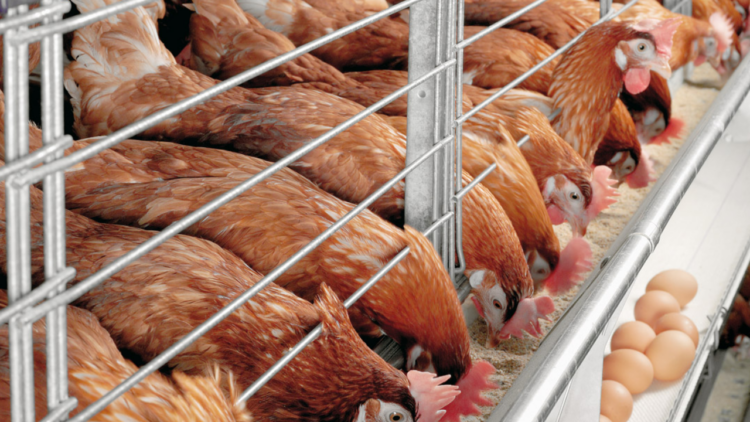Maize Shortage: Nigeria’s $4.2bn Poultry Sector On Brink Of Collapse

Nigeria’s poultry sector, worth $4.2 billion, is facing a critical situation as farmers and operators warn of impending closures, shortages, and high prices of poultry products across the country.
LEADERSHIP Data Miners revealed that the poultry sector, which accounts for approximately 25 percent of Nigeria’s agricultural GDP, has continued to face a harsh economic environment.
The Poultry Association of Nigeria is particularly concerned about the scarcity and soaring prices of maize, a vital feed for birds, which is driving the sector towards collapse. The operators say this crisis poses a serious threat to the advancement of the Nigerian poultry sector and puts over 25 million jobs within the value chain at risk.
LEADERSHIP also gathered that the scarcity of maize has had a profound impact on the poultry industry as it constitutes 60 to 70 percent of poultry feed. Consequently, egg and chicken prices have skyrocketed due to the current shortage and inflated maize prices. The operators say urgent interventions are needed to protect the viability of the poultry industry and safeguard the livelihoods of millions of Nigerians who depend on this essential sector.
Consumers are also feeling the consequences of maize scarcity, as egg prices have surged by a staggering 118.34 percent since maize imports dropped by 97.91 percent. The rising cost of eggs, a primary protein source for many, is a cause for concern. The closure of numerous farms, limited access to credit facilities for farmers, and the high costs of essential feed ingredients like maize and soybeans have contributed to the increase in egg prices.
Mr. Sunday Akinola, a poultry farmer in Abuja and a member of the Poultry Association of Nigeria (PAN), highlights the various factors contributing to the rise in egg prices. The closure of farms, limited supply, difficulty in accessing credit facilities, and the high costs of feed ingredients have all played a role. Additionally, insecurity and inadequate access roads to poultry farms have hindered egg production despite high demand.
Mr. Akinola expressed concern that the demand for eggs exceeds supply, mainly due to the closure of several farms, and predicts that egg prices are unlikely to decrease anytime soon. The instability of exchange rates further adds to the uncertainty surrounding egg prices in the coming months.
In the light of these challenges faced by farmers, Mr. Akinola calls on the government to provide assistance. He urges the government to offer grants and make loan facilities more flexible and accessible to farmers. Additionally, he emphasizes the importance of ensuring security for farmers and their farms to support continued production.
In Kano State, poultry farmers have raised concern over ‘worsening’ poultry feed prices in the state. The farmers said that from early this year, they have experienced over 30 percent increase in the prices of poultry feed which, they claim, has had a negative effect on the conduct of the business and is threatening the entire value chain of the business.
Recent checks in the state revealed that poultry feed is now selling between N8,000 and N10,500 per 25kg bag, depending on the brand.
According to PAN chairman, Kano State chapter, Umar Usman Kibiya, many Kano poultry farmers are considering shutting down their businesses due to the rising prices of feed and maize.
He said, “The competition for maize supply among confectionery companies, local consumers, and the animal feed sector has led to scarcity and price hikes. The cost of importing maize has increased, adding to the problem. Some farmers are switching to local poultry production as it requires less expensive feed. Maize has become highly sought after, with prices soaring from N23,000 to over N33,000 at the Dawanau International Grain Market. Fortunately, some companies have opened their stores to supply maize, preventing a complete scarcity. Maize is a crucial ingredient in poultry and animal feed production, and it is also a significant food source in the northern part of Nigeria.”
Similarly, PAN in Delta State has raised concern about the potential closure of 600 poultry farms in the region. This dire situation is attributed to the soaring cost of maize, a vital ingredient in poultry feed formulation.
Eric Tomfawei, the state chairman of PAN, revealed that the price of maize had increased by over 75 percent, from N225,000 to N405,000 per tonne. Despite this price surge, local farmers are unable to raise the prices of their poultry products due to an existing surplus in egg and broiler production.
To combat the crisis, Tomfawei appealed to relevant government agencies, specifically the Federal Ministry of Agriculture and Rural Resources, to release ample quantities of maize from the strategic food reserve to the poultry industry at discounted rates.
He accused the Nigeria Commodity Exchange (NCX) and the Strategic Maize Reserve (SMR) of the Central Bank of Nigeria (CBN) of exacerbating the situation, for allegedly cancelling the allocation of 40,000 metric tonnes of maize meant to support poultry farmers, leading to frustration among the stakeholders.
Tomfawei called for an investigative panel to address these allegations and get to the root of the matter.
He also warned of potential youth restiveness in the Niger Delta region due to the looming threat of farm closures and the subsequent layoff of youths engaged in the poultry sector. This is aside the food crises and heightened security implications. To prevent the imminent collapse of the poultry industry, Tomfawei called for support and emphasized the need for stakeholders to take appropriate measures to avoid the country becoming dependent on imported poultry products.
To Deola Salami, a nutritionist, rising prices have made eggs and other animal-based protein sources, like beef, pork, chicken, and fish, unaffordable for many Nigerians, and that since plant-based sources of protein, such as beans and soybeans, are also out of the reach for most people, many are feeding on unbalanced diets with a heavy reliance on carbohydrate-based foods.
She said, “This situation is posing dangers to efforts to minimise malnutrition and hunger in the country, especially in insurgency-infested areas. A UNICEF report indicates that millions of Nigerian children are malnourished, underweight, and suffer from severe acute malnutrition (SAM) every year.”
An agriculture sector expert and stakeholder, Dr. Owolabi Hassan, also expressed concern about the steep increase in egg prices, stating that it had become unaffordable for the average Nigerian, considering that egg is one of the most common sources of protein.
Stressing the importance of eggs in the human diet due to its essential amino acids in the right proportion, he noted that intensive research had been conducted to find viable alternatives to maize and that some successes have been achieved; however, most of these substitutes are not available in commercial quantities and can only support small-scale backyard poultry farming.
Source: www.leadership.ng





